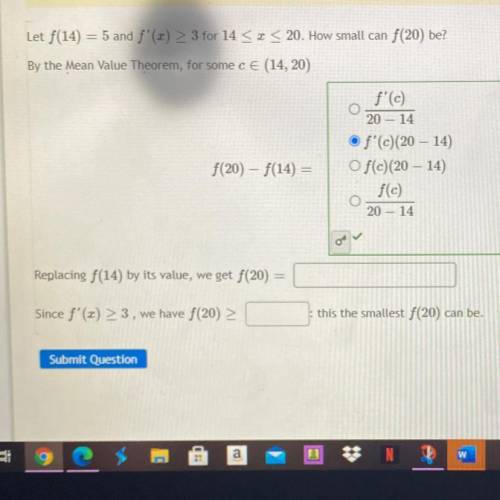
Mathematics, 04.03.2021 04:30 gudtavosanchez19
Let f(14) = 5 and f'(2) > 3 for 14 < I< 20. How small can f(20) be?
By the Mean Value Theorem, for some c E (14, 20)
f'(c)
20 - 14
of'(c)(20 - 14)
Of(c)(20 - 14)
f(c)
20 - 14
F(20) - f(14) =
Replacing f(14) by its value, we get f(20)
Since f'(2) >3, we have f(20) >
this the smallest f(20) can be.


Answers: 3
Another question on Mathematics

Mathematics, 21.06.2019 18:30
Acoin bank containing only dimes and quarters has 12 more dimes than quarters. the total value of the coins is $11. how many quarters and dimes are in the coin bank?
Answers: 1

Mathematics, 21.06.2019 19:20
The graph below shows the height of a projectile t seconds after it is launched. if acceleration due to gravity is -16 ft/s2, which equation models the height of the projectile correctly?
Answers: 2

Mathematics, 21.06.2019 20:30
Aregular pan has a length that is 4/3 the width. the total area of the pan is 432in.2. what is the width of the cake pan?
Answers: 1

Mathematics, 21.06.2019 22:30
At the beginning of year 1, carlos invests $600 at an annual compound interest rate of 4%. he makes no deposits to or withdrawals from the account. which explicit formula can be used to find the account's balance at the beginning of year 5? what is, the balance?
Answers: 1
You know the right answer?
Let f(14) = 5 and f'(2) > 3 for 14 < I< 20. How small can f(20) be?
By the Mean Value Theo...
Questions


Mathematics, 20.10.2019 00:30

Health, 20.10.2019 00:30


Mathematics, 20.10.2019 00:30


History, 20.10.2019 00:30








English, 20.10.2019 00:30



Social Studies, 20.10.2019 00:30

Mathematics, 20.10.2019 00:30




